A few years ago, success seemed assured for pianist Gabe Dixon. Jaime Cullum and Alison Krauss were singing his praises, and he’d been integral to one of Paul McCartney’s most critically lauded albums in years.
So bright were his prospects that he even turned down the ex-Beatles’ offer to become a permanent band member, focusing instead on his own major-label debut as leader of the Gabe Dixon Band.
Things didn’t quite work out as planned. Instead of stardom, he found himself stuck in record label limbo, his longtime band scattered and unable to record.
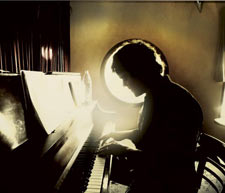
Finally free of contractual obligations, he’s back, on a new label with a brand new album. We spoke on a rare day off; Dixon was in New York City following a sold out show, his last free day before a month of tour dates.
He started the Gabe Dixon Band in 1998, while attending the University of Miami. They quickly gained a following in the jam band scene, and after releasing an independent album in 2000, the group signed with Warner Bros/Reprise Records.
Their Warner debut was produced by David Kahne, who was slated to helm McCartney’s Driving Rain immediately following the sessions. Impressed with Dixon’s abilities, Kahne recommended him for the McCartney album.
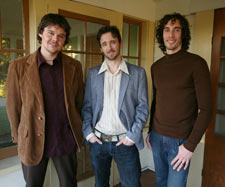
Photo by Henry Diltz
Not surprisingly, playing with a Beatle was a like a dream come true. Professionally and personally, the experience was exhilarating.
“He’s just great,” Dixon enthuses, “a warm, caring and sweet individual. He treated everybody equally, everyone with dignity. There are some people you just wanna to be around, and he’s one of those people.”
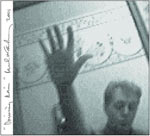 McCartney modeled a solid work ethic. “he was there on time every day. i felt like i was going to school – getting up really, really early and working in a very disciplined way. i ended upon every track. it was pretty much like a band; just paul, me, [drummer] abe laboriel, jr, and [guitarist] rusty anderson. paul would bring us songs, we’d come up with an arrangement and go in and track stuff.”
McCartney modeled a solid work ethic. “he was there on time every day. i felt like i was going to school – getting up really, really early and working in a very disciplined way. i ended upon every track. it was pretty much like a band; just paul, me, [drummer] abe laboriel, jr, and [guitarist] rusty anderson. paul would bring us songs, we’d come up with an arrangement and go in and track stuff.”
Eight months after the album sessions, McCartney organized The Concert For New York, a benefit performance at Madison Square Garden for victims of 9/11. It was about as high profile as a show could be. The event was broadcast around the world, released on CD and DVD, and later selected by Rolling Stone as one of the ‘50 Moments That Changed Rock ‘n’ Roll.’ Dixon played keys, but it would be their only live performance together. “They asked me to do the tour; but I had to do my own thing with my band, because we had the record coming out.”
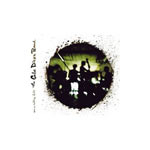 His band’s major label debut, On A Rolling Ball was released in the fall of 2002. In spite of solid reviews, they were out of commission almost from the start.
His band’s major label debut, On A Rolling Ball was released in the fall of 2002. In spite of solid reviews, they were out of commission almost from the start.
“We were very young, so we were happy to get a record deal, and just signed on faith. It was great for a little while,” he recalls. “We were able to make the one album, and that was a great experience. But pretty soon after we got signed, the personnel changed at the label.”
What happened next is a classic example of industry logic at its worst; if Rolling Ball were a success, the label would look bad for firing whoever discovered the act. If the band was dropped, and then had a hit with another label, Warners would look even worse. Thus, the album was released, but for all intent, ignored, while the band waited out their contract.
“It was very frustrating. We had to kind of be in limbo. It never got released in the proper way, and there just wasn’t much focus. They saw potential, but they didn’t sign us. I don’t know what they were thinking exactly,” he laughs, clearly relieved to be talking in the past tense, “but I know they weren’t thinking much about us.”
In addition to record company woes, changes were taking place on the home front. “The band itself was going through some transitions at the time. One of the things that drove us in more of a rock/pop direction is that we became a trio [Dixon, drummer Jano Rix and bassist Winston Harrison]. We had a sax player who we all ultimately realized was not right for the band. That was difficult for all of us, because we were friends, but it’s just, change happens.”
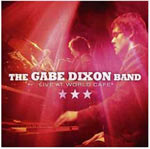 There would be no follow-up studio album, but Warner did release Live At the World Café, a six-track EP. Trimmed down to a three piece, the impact is immediate. A take on ‘Hey Joe’ – the only non-original recording – is clearly inspired by Jimi Hendrix’s landmark version. Despite the absence of guitar, the group comes remarkably close to capturing the essence of the Hendrix masterwork.
There would be no follow-up studio album, but Warner did release Live At the World Café, a six-track EP. Trimmed down to a three piece, the impact is immediate. A take on ‘Hey Joe’ – the only non-original recording – is clearly inspired by Jimi Hendrix’s landmark version. Despite the absence of guitar, the group comes remarkably close to capturing the essence of the Hendrix masterwork.
After the EP, things slowed to a complete stop.
“We were finished with Warner Brothers, and had to relocate to our home states. Jano is from New York, Winston is from Louisville, Kentucky, and I’m from Nashville. So we were not a band, basically, for a couple of years. I spent most of that time writing songs and doing demo recordings. We did a show or two here and there, and whenever we’d play, we’d say ‘Gosh, we’ve got to keep doing this.’”
There was pressure to go solo. “I had other musicians in Nashville who were saying ‘Man, I will play with you anywhere, anytime, for free. Just give me a call, you know, let’s do this.’ And I still felt like I was in the band, so I called them up, and said; ‘Look, these guys want to play with me on this date. Is that cool?’ And one time, Jona said; ‘No – that’s not cool, man. That’s not.’ If it had been okay, I probably would have played with them, but I’ve got a lot of respect for Jono and Winston, and I don’t want to lose them as musicians or as friends. Luckily, we were able to work it out so we could be a band again, where we all relocated to Nashville. That’s kind of the second beginning of the band.”
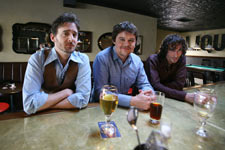
He’s clearly a team player, and repeatedly praises his partners. “I think I’m a decent singer/songwriter. I can go and play solo shows and I can play my music with other musicians, but we really are a band. There was never really any other group that I felt quite as home with. Jano and Winston and I have known each other for so long, I feel like at this point we can kind of finish each other’s musical sentences.”
After shopping the new material, they settled on Fantasy Records, a legendary label with a formidable catalogue, including jazz pianists Vince Guaraldi, the Prestige, Milestone and Riverside Records rosters, Creedence Clearwater Revival, and more recently, singer/songwriter Tiff Merritt. He’s thrilled to be with the label.
“We’re in good company. This time, we definitely took our time more. We wanted a place that would be able to provide us the necessary promotion and resources that we need, but that wasn’t too big of a label. We were kind of afraid of getting lost in the shuffle of a major label, so we wanted to find that balance. And I really think we found the right company. It feels like a big team now. They’re very passionate about our music, just like we are.”
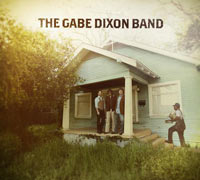 The new album confirms Dixon’s gift for writing personal, yet universally relatable songs. There’s little that would indicate roots as a jam band – the trio has evolved into a tight, song-focused aggregation. “We’ve come a long way. When we first started we were essentially a jam band. We had some pretty good songs, but mostly, we did a lot of improvising. Within the last three years we’ve gained a real appreciation for arrangements that support the song.”
The new album confirms Dixon’s gift for writing personal, yet universally relatable songs. There’s little that would indicate roots as a jam band – the trio has evolved into a tight, song-focused aggregation. “We’ve come a long way. When we first started we were essentially a jam band. We had some pretty good songs, but mostly, we did a lot of improvising. Within the last three years we’ve gained a real appreciation for arrangements that support the song.”
Approaches for achieving suitable arrangements varied. “Some of them we labored over for a long time. Others, we just went straight in, and it was really easy.” For instance, ‘Further The Sky;’ “The guys didn’t even know the song until we were in the studio and I played it for them. We worked something out in a few minutes, hit ‘Record,’ and there you have it. It runs the gamut from that to a song like ‘Far From Home’ which we’ve been playing for years, and changed the arrangement on probably five times.”
More than any other artist, Dixon evokes early period Elton John, both on record and in concert; “He’s my biggest piano player-singer/songwriter influence. His stuff from the early 70s is something I really gravitated to early on.”
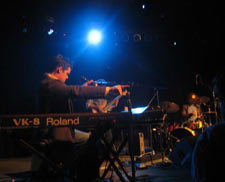 Live, the trio brings to mind John’s 11/17/70 one of the great concert albums, which coupled tight arrangements with unexpected, seat-of-the-pants stylistic turns. “We still have an improvisational spirit,” Dixon notes. “We stretch out a little bit more live, but we don’t take a whole lot of long solos. It kind of depends on the show and how long of a set we have.”
Live, the trio brings to mind John’s 11/17/70 one of the great concert albums, which coupled tight arrangements with unexpected, seat-of-the-pants stylistic turns. “We still have an improvisational spirit,” Dixon notes. “We stretch out a little bit more live, but we don’t take a whole lot of long solos. It kind of depends on the show and how long of a set we have.”
Their New York appearance – second on a three-act bill at the famed Bowery Ballroom – marked a homecoming of sorts. “We’ve played New York several times. We actually lived there for a year. But it was our first time ever going to the Bowery Ballroom to play, and it went really well. We had a sold out crowd, and they loved it. We put on a really great show.”
Since the band’s last release, the record industry has gone through a radical transformation, with an almost wholesale restructuring of the way business is done. Dixon is excited by the changes. “Ultimately, this will prove to be a great thing for the music industry. We’ve already seen the democratization of music with sites like Myspace and all the places where you can go and listen to people’s music, where basically anyone can get their music out to the public.
“But at the same time, there are so many media outlets now, that if you are to have any kind of major success, you have to hit them all at that same time. Be everywhere at once. It’s not like you just go on one late night talk show, and all of a sudden you’re rich and famous.
“The musicians – the bands – have to work harder for what they want. For us, we just want to be able to get our music out to as many people as we can, and at least make a living; be and able to do it as a career.”
He’s well aware that few musicians get a second chance like he’s been given. Regardless of trends, industry machinations, or downright luck, he’s in it for the long run. “I’ll always be playing music. Right now, I happen to be with this great band in this situation where we have a great record deal, on a really, really fantastic tour. I don’t know if I see myself touring hundreds of dates a year twenty or thirty years from now, but I’ll always be playing, writing, and composing music. That’s been my interest since I was a little kid, and I will never stop doing that, ever.”
In all likelihood, his biggest influence was his parent’s record collection. “My parents are Baby Boomers,” Dixon notes, “they grew up in the late 60s and early 70s, so they had tons of LPs in the house: James Taylor, Allman Brothers Band, Joe Cocker, Jimi Hendrix, Joni Mitchell – the Beatles, of course – all these amazing singer/songwriters and musicians. I just kind of devoured a lot of that stuff. That was the foundation for me.”
The era was typified by wide open playlists, with few stylistic boundaries. “Radio was very different back then. They would play whatever music they liked. I can’t really imagine what it was like, but based on my parents’ collection, it must have been a pretty eclectic time in music.”
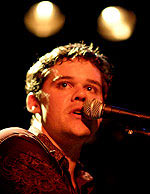 In his teens he became enamored with blues music. Favorites included the three Kings – B.B., Freddie and Albert – Buddy Guy, Albert Collins, and Eric Clapton; “All the great blues players. I really connected with that, I think because I was a teen. They would talk about getting their heart broken and stuff like that, and it really resonated with me.”
In his teens he became enamored with blues music. Favorites included the three Kings – B.B., Freddie and Albert – Buddy Guy, Albert Collins, and Eric Clapton; “All the great blues players. I really connected with that, I think because I was a teen. They would talk about getting their heart broken and stuff like that, and it really resonated with me.”
Pop hits of the day left him cold, but there were contemporary artists he admired. “It wasn’t all old stuff – especially when I got to college. I became a huge fan of Radiohead and Jeff Buckley. Ben Folds was also a major influence. I just couldn’t believe it the first time I heard him play. I still think he’s genius.”
By ’98 Dixon was attending University as a classical piano major, and heavy into the jam band scene. The progression from blues was entirely natural. “When I talk about being a jam artist, that’s sort of where it stems from; I came from blues to jazz and jam music. I got into the band Phish; I actually followed them around a little bit, and the Dave Matthews Band, and Medeski, Martin & Wood.”
Through every phase, his folks offered encouragement. “My parents were very supportive. Some stuff that I got into – like Dave Matthews – they didn’t really connect with. But that was okay, they respected that I liked some music that they didn’t. They could at least understand. We’ve always been on the same general page, musically. They had a good push and pull when it came to my development, letting me blossom on my own without going into really bad sort of places of influence.”
In many ways, Dixon is a testament to the power of positive parenting. Both his musical roots and moral convictions stem from their examples. Growing up, there was little in the way of acting out. “I had the usual things that a lot of teenagers go through, like I wanted to go and hang out with my friends at night, and sometimes that just was not okay with my mom, especially. We would get into big shouting matches over that, and it didn’t seem fair. I look back now, and think, ‘Well, she had a pretty good grasp of the situation, who my friends were and all that.’ I’m really glad that she had such a good handle on what was going on.”
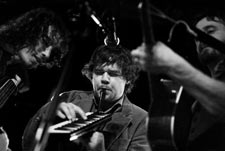
His parents had been occasional church goers prior to having children. “They were kind of off and on for awhile there, but when they had kids they wanted us to go to church, to go to Sunday School and learn about Jesus and all that stuff. So, like I think a lot of people do, they got more involved once they had kids. They became very involved in church for quite a few years while I was growing up.”
When he was in Middle School, his mother became a minister. “She got the call, and decided she wanted to go into ministry. She attended Vanderbilt Divinity School, and became a Minister at the church where I grew up in for awhile. She’s done a lot of hospice work, and works for the Disciples of Christ in our region.
“That had a big impact on me. I had a lot of questions for her around that time. I had a lot of questions about a lot of things. She was studying theology and really questioning a lot of things herself, and it was nice for me to be able to go and ask her spiritual questions. She was very open with what she thought about things.”
Despite growing up around the church, there was little interest in music marketed specifically to Christian youth.
“For whatever reason, I never gravitated towards Christian rock. It’s only my opinion, but it always rang a little hollow to me. I never heard any Christian music that was breaking any musical ground or was interesting to me at all. More recently I’ve heard some that I like.”
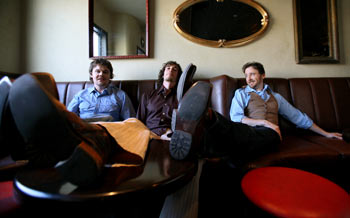
He considered recording with a Christian music label “for about a minute” – but decided against it, uncomfortable with the entire concept. “I don’t know; I was raised to believe that you should be humble, that you should go in your closet, and not pray loudly in public, that kind of thing. Other people may wear their religion on their sleeve, but that’s just not the way I look at religion.
“It’s just never sat well with me, to go out and speak loudly about things that we can’t as human beings fully understand – our minds can’t understand the infinite. So how I can I go around pretending that I understand? All I can do is feel that presence and pray for guidance.
“There are probably many, many wonderful people in the Christian music industry – I know several of them – but I didn’t understand how you could go and say ‘Okay, I’m going to go and capitalize off of Jesus’ name, God’s name.’ That never sat right with me. And I’m sure there are creative ways to do it, and there are tons of those bands who tithe; give 10% of their profits, and things like that. But I never could reconcile it, personally.”
His theology is practical, and to the point. “I believe that the teachings of Jesus are the most important part of Christianity, and that Jesus calls us to love one another above all else. So I don’t get so caught up in whatever rules people say that there are, because you could argue scripture all day long, but one thing that’s really clear is that Jesus teaches us to love one another.”
For Dixon, one of the most pressing issues of the day is the environment. He takes the Biblical admonition to be stewards of the earth seriously, and a portion of the group’s earnings go to support environmental organizations.
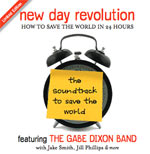 They’re involved with the website CoolPeopleCare.org and recently contributed an exclusive track included with the book New Day Revolution: How To Save The World In 24 Hours.
They’re involved with the website CoolPeopleCare.org and recently contributed an exclusive track included with the book New Day Revolution: How To Save The World In 24 Hours.
In keeping with the commitment to lessen their carbon footprint, the new CD packaging is environmentally friendly. That’s not to say the aesthetic aspect is ignored: Dixon enticed legendary rock photographer Henry Diltz – whose work has adorned LP covers by the Doors, Crosby, Stills & Nash, the Eagles, Joni Mitchell and countless others – to shoot the band for the disc’s package.
His intended audience is not restricted to those who embrace specific doctrines. “I want to appeal to people on a human spiritual level, more than I want to appeal to Christians on a Christian level. So I’d rather just be an example, and I think my Christian ethics will shine through a little bit better if I don’t make a big deal out of the fact that I grew up in a Christian church.
Like many musicians, he believes music is a manifestation of the divine, and that God’s presence can be experienced while playing. “I do. Absolutely. And it’s usually when I don’t think too hard about it. I find the more grateful I am, and the more I invite that presence in, the more it’s there. And the better things go.”
Curiously, the artist’s spiritual attunement – or lack thereof – might be incidental “I don’t think they need to necessarily be consciously aware of it for it to happen – for it to be there. We’ve seen many artists in the past who have been on drugs, or just out of their minds, and they produced amazing art.
“Great music – at the heart – the reason people connect with it, is because it transcends their ordinary experience. So the artist, however they’re transcending that experience, whether they’re praying before they go onstage, or whether they just feel inspired, [whether they] believe in God or not – it doesn’t mean that the presence isn’t there. It doesn’t mean that God isn’t working through them.
“I think it’s probably more effective when you can step aside, and let that spirit work through you, consciously.”
To that end, he tries to be aware of the bigger picture. “Before I go onstage, I always pray for God to be with me. I pray the spirit will be in that place that I’m playing, and that I’ll help it to be there. I feel like I’ve been given a gift of music, and I don’t always know how to use it, to do God’s will. All I can do is pray for guidance, and so that’s what I do.”
Over the years, Dixon’s faith has played an increasingly important role in his music.
“You kind of go through periods where you don’t feel as connected to God, and then other times where you realize how important belief and faith and that connection is – and I’ve just found that there’s really no point in me doing what I do, unless God has something to do with it. Otherwise, it’s all vanity.”
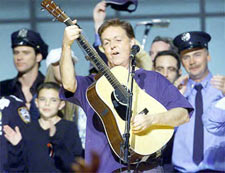 He believes many of attributes he aspires to were modeled by Paul McCartney during their time together. “He has so much compassion and love, and it’s just nice to be in that presence. And musically, of course, he’s a genius.”
He believes many of attributes he aspires to were modeled by Paul McCartney during their time together. “He has so much compassion and love, and it’s just nice to be in that presence. And musically, of course, he’s a genius.”
Dixon turned down McCartney’s offer to tour, but they did play the one show together at Madison Square Garden.
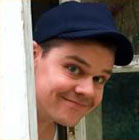 Even in the glare of the spotlight, McCartney’s unpretentious nature came across in a variety of ways, including – much to Dixon’s amazement – sharing a dressing room with the band rather than receive preferential treatment.
Even in the glare of the spotlight, McCartney’s unpretentious nature came across in a variety of ways, including – much to Dixon’s amazement – sharing a dressing room with the band rather than receive preferential treatment.
“He’s a very classy guy; all these celebrities were coming in, and he had so much grace. Everyone who came in was treated with great respect. He gave my parents the same sort of attention as he did Bill Clinton, or whoever else was there. And that’s refreshing. When Paul McCartney is that good of a person, it doesn’t really give anybody else an excuse to be a jerk.”
© John Cody 2008
